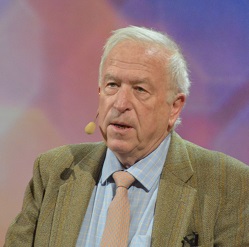“Since there is no telling in advance where it may lead, reflection can be seen as dangerous.”
Introduction, p. 11
Think (1999)
Simon Walter Blackburn ist ein britischer Philosoph, der von 2001 bis 2011 in Cambridge lehrte. Vorher hatte er einen Lehrstuhl an der University of North Carolina at Chapel Hill inne. Von 1969 bis 1990 war er Fellow und Dozent am Pembroke College . Er war von 1984 bis 1990 der Herausgeber der Zeitschrift Mind. Blackburn ist Vizepräsident der British Humanist Association.
2008 wurde er als ausländisches Ehrenmitglied in die American Academy of Arts and Sciences gewählt.
Wikipedia

“Since there is no telling in advance where it may lead, reflection can be seen as dangerous.”
Introduction, p. 11
Think (1999)
Kontext: We hope for lives whose story leaves us looking admirable; we like our weaknesses to be hidden and deniable... We want to enjoy our lives, and we want to enjoy them with a good conscience... Ethics is disturbing. We are often vaguely uncomfortable when we think of such things as exploitation of the world's resources, or the way our comforts are provided by the miserable labour conditions of the third world... Racists and sexists, like antebellum slave owners in America, always have to tell themselves a story that justifies their system.
Simon Blackburn, Being Good (2001)
Quelle: Think (1999), Chapter Four, The Self, p. 136
“Finding a mechanism does not bypass the problem of induction.”
Quelle: Think (1999), Chapter Six, Reasoning, p. 227
Quelle: Think (1999), Chapter Five, God, p. 162
Quelle: Think (1999), Chapter Four, The Self, p. 146
“Motion however will not help unless we have things moving.”
Quelle: Think (1999), Chapter Seven, The World, p. 244
“Contemporary culture is not very good on responsibility.”
Quelle: Think (1999), Chapter Three, Free Will, p. 105
“Why should thinkers mock the simple pieties of the people?”
Quelle: Think (1999), Chapter Five, God, p. 190
Quelle: Think (1999), Chapter Six, Reasoning, p. 225
“Paradigms can be asked to show their worth, an some of them do not stand up.”
Quelle: Think (1999), Chapter Six, Reasoning, p. 231
Quelle: Think (1999), Chapter Three, Free Will, p. 106
“But if nothing does as well as something about which nothing can be said, it vanishes.”
Quelle: Think (1999), Chapter Five, God, p. 173
Quelle: Think (1999), Chapter Five, God, p. 170
“Perhaps to restore human freedom we should deny determinism?”
Quelle: Think (1999), Chapter Three, Free Will, p. 84
“The word "philosophy" carries unfortunate connotations: impractical, unworldly, weird.”
Introduction, p. 1
Think (1999)
Quelle: Think (1999), Chapter Eight, What To Do, p. 270
Quelle: Think (1999), Chapter Five, God, p. 169
“What underlies our assignment of probabilities in the real world?”
Quelle: Think (1999), Chapter Six, Reasoning, p. 212
Quelle: Think (1999), Chapter Two, Mind, p. 78
Quelle: Think (1999), Chapter Eight, What To Do, p. 278-279
Quelle: Think (1999), Chapter Three, Free Will, p. 117